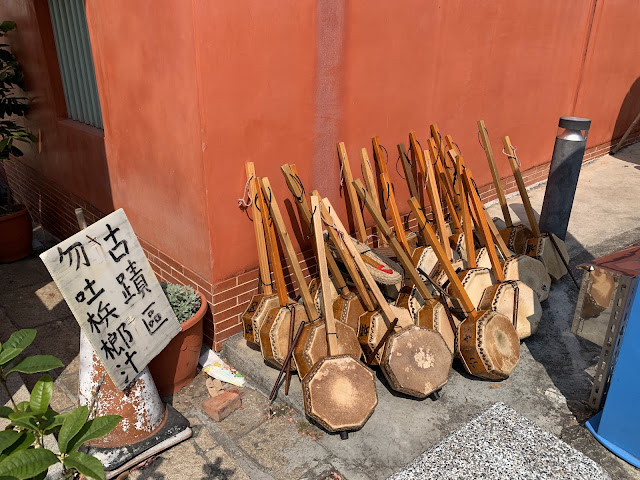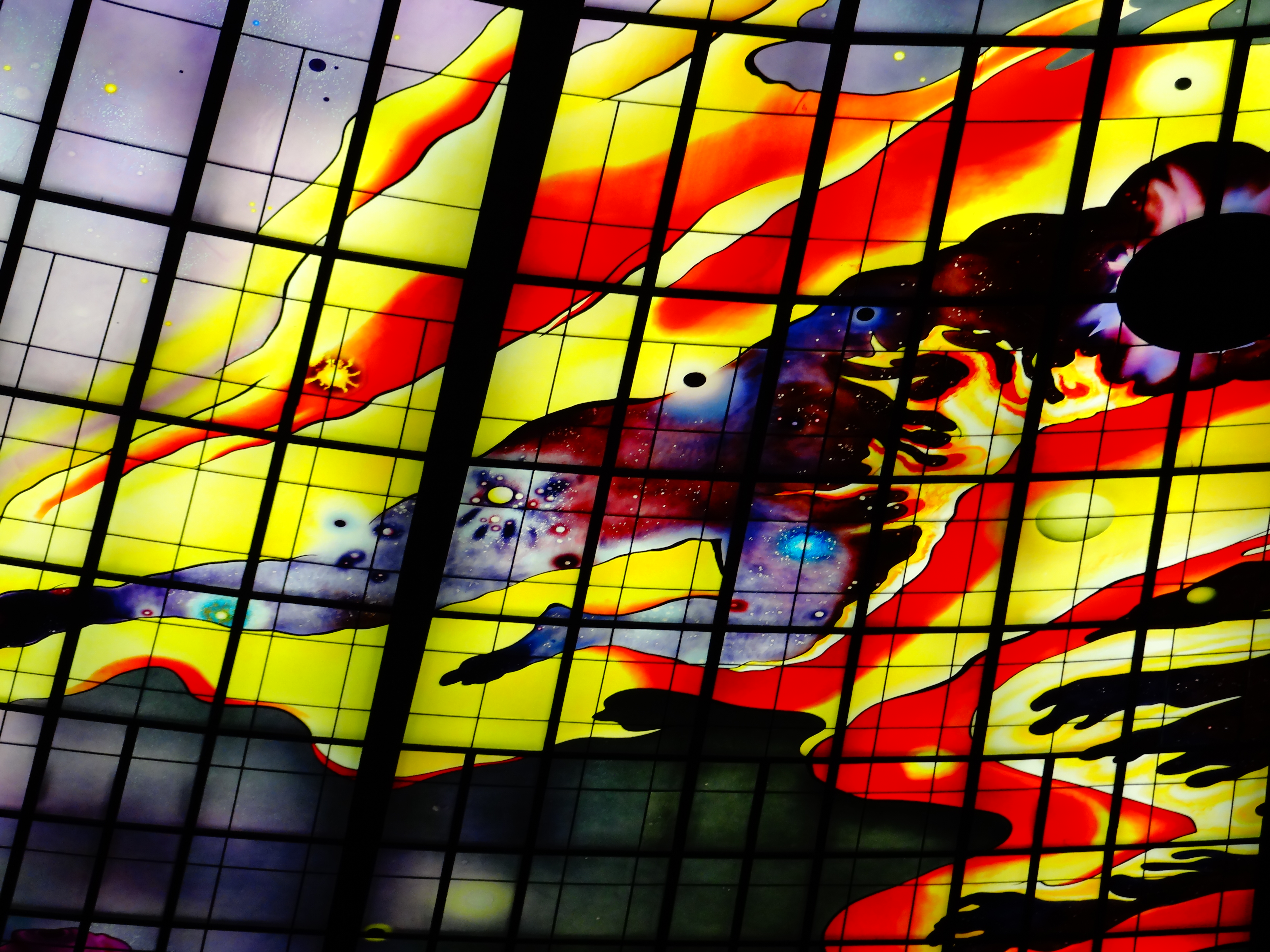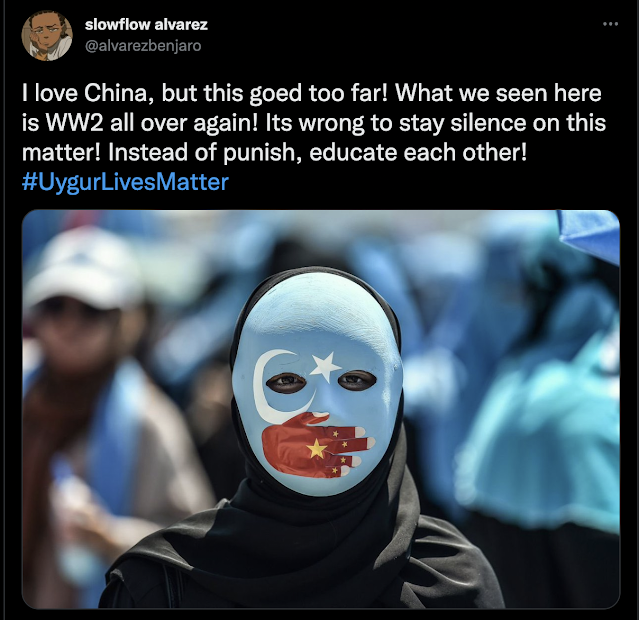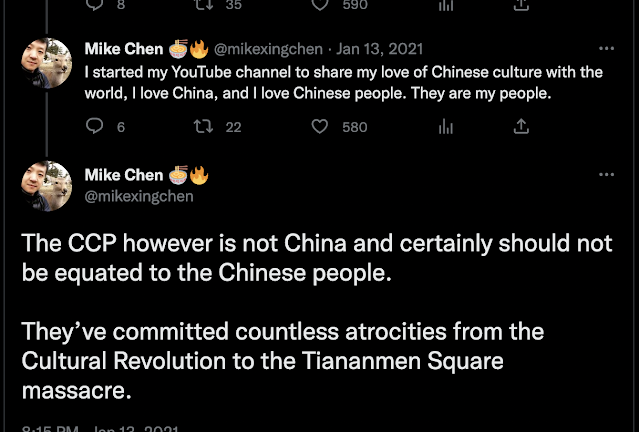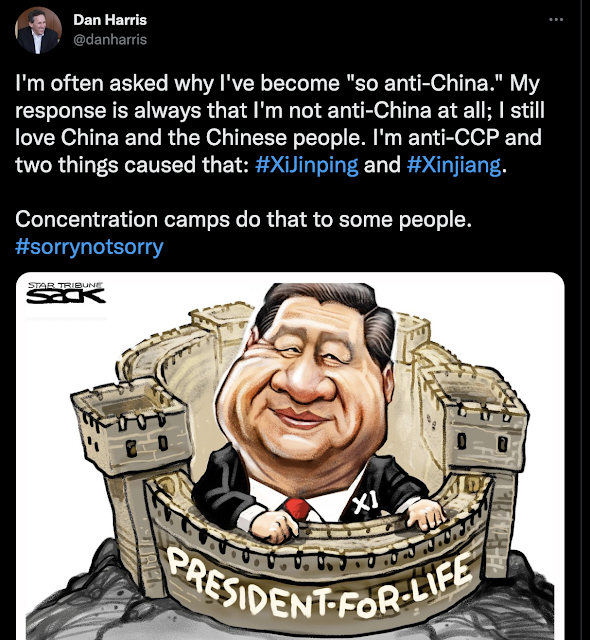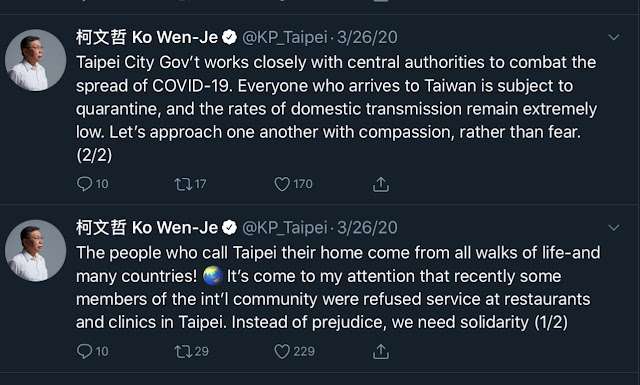In recent weeks, a spate of opinion pieces have come out that lay out three very dangerous ideas: call for Taiwan to roll over and obey China as though it's the only possible option; romanticize the Ma Ying-jeou administration as some sort of golden era for Taiwan; and blame everyone but China for China's intentional maliciousness toward Taiwan.
You can read some examples in the New York Times, by former Minister of Culture and author Lung Ying-tai, and by some so-called analysts from the Carnegie Endowment for International Peace in Foreign Policy, if you find them readable. It was a struggle, to be sure.
Fortunately, these articles have received some sort of pushback. Unfortunately, although I like the Taipei Times, it doesn't have the readership of the New York Times or Foreign Policy, though those who meaningfully care about Taiwan surely include it among their regular news sources. This is (almost) as it should be: the original opinionators have every right to have and speak their minds, however misguided, and anyone can respond in disagreement. I only wish that the pushback would get as much press as the people who disseminated the original problematic views.
All three of these opinions are problems for the same reason -- they blame the wrong people, and thus lay out a course of action that would utterly destroy Taiwan. I don't know whether this is due to the age-old problem with Taiwan "experts" pretending the Taiwanese electorate is still divided on whether or not China is a trustworthy negotiating partner (they aren't) because that sort of tension keeps them -- the analysts -- relevant, or they themselves being part of the anti-Taiwan opposition. The latter is certainly true in the case of Lung, who served under President Ma.
Perhaps they're simply not informed about why China seemed friendlier when Ma was president and would probably be friendly again under a hypothetical future KMT administration. This is somewhat understandable, as a surface-level understanding of the mechanics of Chinese manipulation and KMT collaboration with Taiwan's only enemy implies that KMT politicians are better negotiators when it comes to dialogue with the CCP. Of course it looks like that! If they weren't, why would China be so much friendlier when they were in power?
To this end, Lung says:
For decades, Taiwan and China were deeply estranged and essentially in a state of war. But after the Cold War, relations gradually thawed. They were at their best during the presidency of Ma Ying-jeou, of the Kuomintang, from 2008 to 2016. The Kuomintang emphasizes cooperation with China as a way to ensure Taiwan’s stability and prosperity.
Under Mr. Ma’s administration, exchanges in academia, culture and commerce flourished, culminating in his historic meeting in 2015 with President Xi Jinping of China. It seemed, after decades of hostility, that reconciliation was possible.
I see this echoed by others, as well:
That said, let's focus on Ma. The fundamental misunderstanding here is reading the China-Taiwan rapprochement as some sort of accomplishment of Ma's, not an intentional Chinese manipulation that made it seem as though Ma's approach were somehow superior. Forces within Taiwan -- business interests, mostly, and some traitorious politicians -- have also acted intentionally to make it seem as though the KMT is better for Taiwan-China relations than the DPP due to some imaginary flaw with the DPP's approach to China.
Ma was the opposite of an independence supporter (he was, and remains, a filthy unificationist), but his stated policies, for the most part, weren't that different from the DPP's. The DPP has never been less open to trade or dialogue with the CCP than the KMT; the problem is that the CCP refuses dialogue with the DPP but accepts the same offers from the KMT. They further undermine the DPP by snubbing their repeated offers of dialogue by meeting with KMT officials instead. Let me repeat: every DPP president -- Chen, Tsai and Lai -- has re-iterated their openness to dialogue with the CCP and trade with China.
It's not the DPP causing rifts, it's the CCP.
It's worse than it sounds, too. Although I'm not quite finished, I've been reading André Beckershoff's Social Forces in the Re-Making of Cross-Strait Relations (review forthcoming). Beckershoff lays out a devastating case for China's intentional smearing of DPP presidents as "the problem", making it seem as though they aren't open to or capable of initiating or engaging in any discussions, let alone peace talks or mutually agreeable rapprochement.
In fact, the CCP was able to sidestep DPP presidents, making them seem like bigger 'troublemakers' than they have been, by engaging instead with the KMT directly, as though they were the ruling party even when they weren't. Beckershoff says of the Chen years:
The DPP's limited success, however, was not for lack of initiative: after first overtures beginning with Chen's election in 2000, the government proposed negotiations on a variety of technical issues from 2004 onwards, but as the party-to-party platform between the KMT and CCP emerged in the same time frame, the Chinese government could afford to stall, decline or even ignore the overtures of the Taiwanese government.
This pattern has continued under Tsai and Lai, with KMT officials, including Ma Ying-jeou himself, visiting China with the purpose of removing the need for the CCP to engage with the DPP, thus undermining the DPP and making it seem as though the KMT are simply 'better' at handling China. The truth is that the CCP wants the KMT or their lapdogs, the TPP, to win elections, and thus makes it seem as though the DPP are the problem.
If the KMT truly supported Taiwan, rather than being focused on Taiwan-as-China, they would let DPP goverments do their job vis-a-vis China and not intentionally get in the way.
Wang Hung-jen and Kuo Yu-jen also point this out:
Lung romanticizes the so-called “golden era” of cross-strait relations under former president Ma Ying-jeou (馬英九), but fails to mention that this era coincided with a more benign Chinese foreign policy under then-Chinese president Hu Jintao (胡錦濤) and the early, still-cautious phase of Chinese President Xi Jinping’s (習近平) rule....The conditions that made diplomatic and economic detente possible no longer exist. Xi’s China is now more assertive, more authoritarian and more willing to use military and economic coercion. The idea that Taiwan can simply return to the “status quo” ante by embracing Beijing’s preferred narratives is at best naive, at worst, a prescription for strategic vulnerability.Many Taiwanese today view the Ma administration’s overly deferential policy toward Beijing as one of the root causes of Taiwan’s current economic overreliance on China and the hollowing out of local industries.The so-called “diplomatic truce” turned out to be an illusion, one that collapsed the moment Taiwan elected a government unwilling to parrot Beijing’s “one China” principle. Beijing’s punitive diplomatic and military responses were not triggered by provocation, but by Taiwan’s assertion of democratic choice.
And make no mistake that Ma was and remains a unificationist. He and the KMT framed rapprochement as an economic benefit, something apolitical. It never has been. His vice-president and co-traitor Vincent Siew gave away the game all the way back in 2001 -- it was never apolitical, but always with the goal of eroding Taiwan's sovereignty:
Siew developed the abstract framework of "economics first, politics later" into a set of concrete initiatives....the mutual trust engendered by this process wouuld also entail the potential for positive integration, a "step by step integration of politics", and thus pave the way for a "sharing of sovereignty" in the long term.
The Ma administration did not respect Taiwan's sovereignty, and the progress made in economic ties and freer travel always came at a price. Ma and his people called them apolitical -- it's just about the economy, they said -- but Siew made it plain long before Ma was elected: this was never, ever apolitical. Unification had always been the goal.
With the KMT, it still is.
Beckershoff also offers some fascinating dissections of cultural and historical ties between Taiwan and China being presented as a grassroots consensus when it was manufactured by the political and capital class, and the instrumentality of business associations in pushing pro-China policies for their own profit and benefit, not the good of Taiwan per se. Those will come up in my review, but I wanted to mention them here as they're tangentially relevant to this very false idea of what rapprochement under Ma was and most definitely was not.
Preferential policies have been assumed from the KMT-CCP Forum...are merely the announcement of unilateral measures taken by the PRC designed to benefit Taiwanese citizens travelling to or living in China as well as enterprises operating there. Delegating the announcement of preferential policies from the party-to-party channel to the Straits Forum entails an effect of obscuration: while in fact, these unilateral decisions are a double-edged generosity of the CCP that is conditional on upholding the 1992 consensus, their announcement at the KMT-CCP Forum make them appear as the outcome of negotiations between these two parties; their announcement at the Straits Forum, however, bestows on them an aura of inclusive grassroots cooperation, designed to contribute to the universalisation of these measures.It's also worth pointing out that if the Ma years were a "golden era" for Taiwan, then the Sunflower Movement would have never happened. It wouldn't have had to.
I lived in Taiwan during the Ma years, and I never felt them to be any sort of golden age. I worried often about the suppression of true grassroots protests (though these various social movements did eventually overcome attempts to sideline them and promote the KMT and CCP's vision of a shared culture, economy and even sovereignty). I worried about filthy unificationists intentionally buying up Taiwanese media to promote pro-China editorial lines. I worried about black box politics, where China's ultimate control of the KMT was obscured by false claims that economic rapprochement was "apolitical".
In fact, I would call the Ma years the eight worst years Taiwan has lived under since democratization. I'd call him the worst elected president Taiwan has ever had. All he ever did was undermine Taiwan. It's true that in the last few years, I've grown worried about China (not Taiwan, not the US) starting a war. But during the Ma years, I was worried about something far scarier: that Taiwan's own government would sell out their country, and there wouldn't be a goddamn thing anyone could do about it.
It was not a good time. It was anxiety-inducing, just in a different, arguably worse, way.
When opinionators praise Ma Ying-jeou, the other edge of that tends to be criticism of Tsai Ing-wen or Lai Ching-te. That's what Chivvis and Wertheim did in Foreign Policy. Rather than quoting them, here's a big chunk of Yeh Chieh-ting's rebuttal:
Calls for a so-called “grand bargain” with Beijing — where the US pressures Taiwan into concessions in exchange for Chinese restraint, or some kind of brokered one-shot resolution — rest on the fantasy that Beijing wants peace and just needs a polite nudge. There is no evidence for this. For decades, the Chinese Communist Party has steadily escalated its military threats, cyberattacks and diplomatic isolation of Taiwan regardless of who is in power in Taipei or how careful they are with their words. When Beijing says it would use all means to annex Taiwan, “by force if necessary,” it is clear that it sees its goal as more important than peace.Therefore, Lai’s recent language, including his description of China as a “foreign hostile force,” is not a wild provocation, but rather a blunt acknowledgment of reality. Beijing flies fighter jets across the median line of the Taiwan Strait, simulates blockades and treats Taiwan as a rogue province to be absorbed. Lai is simply responding to years of coercion. If Taiwan stating the facts “angers” China, that is a problem with China’s ego, not Taiwan’s messaging.Telling the US to “rein in” Taiwan unilaterally does not signal to Beijing any goodwill to be reciprocated. It signals to Beijing that threats work — and that Washington would cave if pushed hard enough.The recent rise in cross-strait tensions is not a result of Lai’s rhetoric. It is the product of Beijing’s relentless “gray zone” operations — cyberattacks, economic coercion and military harassment that now includes near-daily incursions into Taiwan’s air defense identification zone. This is not theoretical brinkmanship. It is real-world intimidation, and it deserves to be called what it is.
Lai isn't wrong, either, to take a harder line on Chinese influence in Taiwanese civic discourse, military spies and political influence. It's no secret that China has wormed its way into all of these spaces, and many military and political leaders are, in fact, spies and traitors. Is it somehow wrong for Lai to try and stop this? Is it wrong to do something about collaborators with a hostile force?
As Wang and Kuo point out:
Lai’s characterization of China as a “foreign hostile force” was not a provocation; it was a diagnosis rooted in empirical behavior. To ignore Beijing’s actions while castigating Taipei’s rhetoric is to invert cause and effect.
Chivvis, Wertheim and Lung all call for Taiwan to bend the knee. From Lung:
With China growing in strength and the United States turning its back on the world, Taiwan is right to build up its military as a deterrence against attack. But the only way for Taiwan to peacefully secure its freedom is to somehow reconcile with China. Recent history suggests that is achievable.
Reconcile how? With a country that wants to annex and subjugate, end Taiwan's democratic system, and take away its promise of human rights, no less.
Taiwan would very obviously have to give these things up in such a "reconciliation". There are no "concessions" (in Chivvis and Wertheim's words) that Taiwan can offer which don't sell out its sovereignty. What can Taiwan possibly offer China that would end these tensions except a path to annexation -- the one thing Taiwan can't give?
Wang and Kuo have it right again:
As for Lung’s conclusion — that without peace there can be no democracy — we suggest the inverse is equally, if not more, true: without democracy, there can be no peace worth having.
Peace that comes at the cost of agency, freedom and sovereign identity is not peace; it is submission.
I've said this before, but the problem isn't Taiwan's rhetoric, or the US, or anything other than the plain, ugly truth: the one thing China wants -- Taiwan's subjugation -- is the one thing Taiwan can never offer. There simply is no middle ground. Every "concession" from Taiwan will be treated as one more step in the march to Taiwan, Province of China. There's no agreement in which Taiwan can truly keep the one thing it values most -- its democracy, and by extension its promises of freedom and human rights -- if it surrenders to China.
Once that happens, all bets are off. Taiwan would not be able to exit such a future. If it allowed itself to be sucked into that black hole, it wouldn't be able to pull out, any more than Hong Kong was. That's what happens when you become a part of China. You don't get out.
Suggesting it is basically telling Taiwanese people that what they want is not important, that their democracy is not important, their self-determination is not important, their human rights are not important. Either that, or the person saying it is stupid enough to believe that Taiwan could retain these things in any way, or back out of a surrender.
Just as abysmal are Chivvis and Wertheim's suggestion that the US force Taiwan into "concessions" and agree to "some kind of One China". The whole point here is that Taiwan doesn't want China forcing it to give up its sovereignty, but somehow the US doing China's dirty work would be acceptable?
Some critics in Taiwan love to point out that the US also represents a form of empire, and they're not wrong. Some also say that the US is the true provocateur of China's aggression against Taiwan, but in this they are wrong. Taiwan doesn't want a war the US sparked, they say. I agree, or I would, if the US were the villain here. Isn't it the same thing from a different angle -- US as world police, telling Taiwan what to do -- if the US pushes Taiwan to do something it clearly doesn't want to? If Taiwan did want to "make concessions" with China, ultimately selling out their own country, it would do so. If the Taiwanese people wanted it, they would vote accordingly.
It also implies that Taiwan is unwilling to engage in dialogue. As above, that's not true: the problem is that China only wants dialogue to the end of annexing Taiwan, it doesn't want an open discussion. Yeh points this out too:
Taiwan wants an open dialogue with China to talk about how Taiwan and China can coexist, whether as separate countries, the same country, or some type of special arrangement. Lai, as well as every Taiwanese president before him, has stated that Taiwan is open and eager to engage in dialogue with Beijing without any preconditions.
However, that is not the dialogue Beijing is interested in having. Beijing’s “dialogue” requires Taiwan to agree it is part of China, therefore agreeing with China’s conclusion, as an admission ticket to the negotiating table. China is only interested in talking about how Taipei is to execute Beijing’s foregone conclusion.
Lung implies that Taiwanese are disillusioned and don't want to fight for Taiwan. The data say otherwise, and her evidence, as Wang and Kuo point out, are a string of anecdotes and one unscientific online poll. This is willful ignorance from a Ma stooge. Even Chivvis and Wertheim understand that this is not something Taiwan wants, which Yeh notes voters have rejected in three straight elections.
Do they care for Taiwan's democracy as much as China or the KMT do -- that is to say, not much at all?
I don't know if this frequent reframing of China's aggression is some sort of intentional disinformation. I don't think people like Chivvis, Wertheim, Oung and Lung have, say, meetings to discuss how to uplift Ma's legacy and shift the blame for China's threats on anyone but China, whether that be Lai or the US.
I do think this narrative that Taiwan is the problem and the Ma years were a "golden age" of China-Taiwan relations was created by some entity (perhaps the United Front, but who knows), and I do think some misguided people believe it, because they don't fully understand the mechanics of what those relations entailed. That is to say, these commentators have bought a story that was manufactured for them. Perhaps Lung herself is one of the manufacturers, given her history with the Ma administration.
They don't know or care about the pressure from business groups, or unilateral CCP decisions presented as the outcome of negotiations with the KMT, or that the KMT sought to undermine the ruling DPP at every turn. They think the idea of a shared cultural heritage is some sort of natural thing, when it was an idea planted by the CCP and their collaborators.
They block from their minds, if they ever really understood, that China was only friendly to Ma because Ma and Siew actively sought to deliver them the annexation they so desired -- all support was predicated on that Faustian bargain.
And certainly, they bring the US into it in whatever way suits their argument. The US is by no means altruistic or a force for good, but in the China-Taiwan conflict, the villain is and has always been China and their collaborators in Taiwan.

